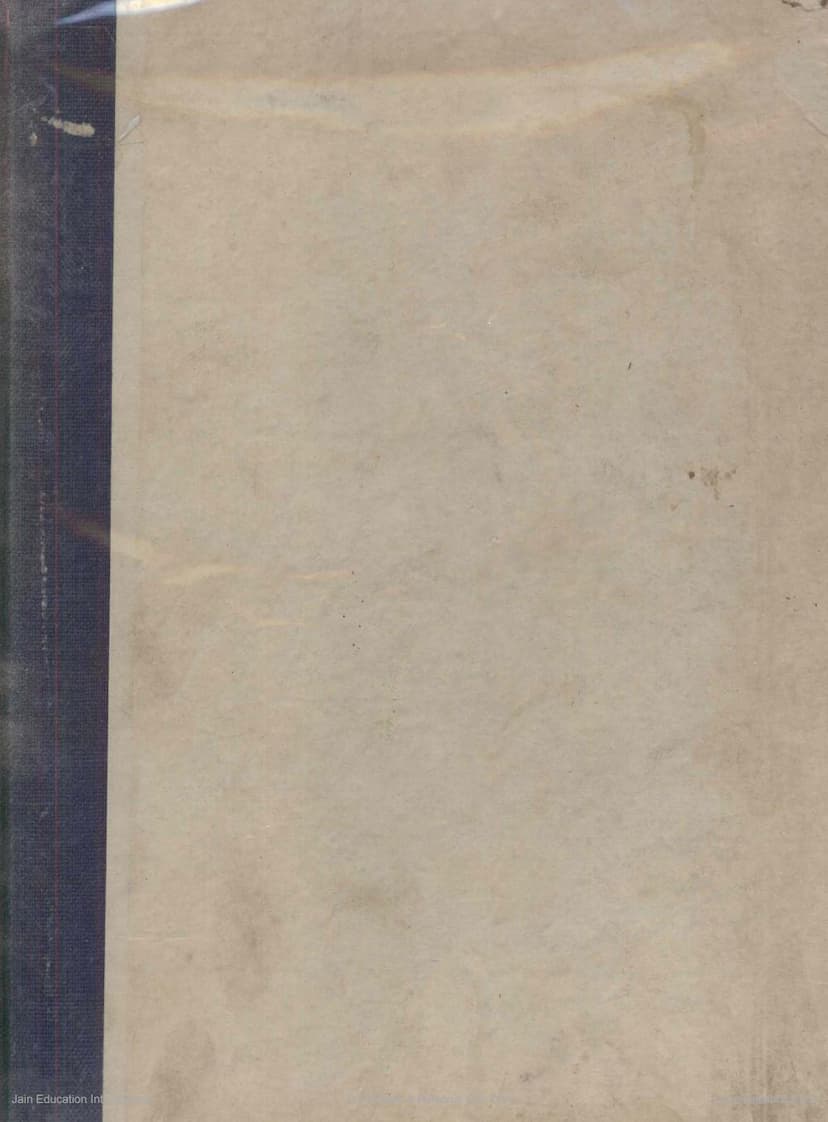Jinvijay Muni Abhinandan Granth
Added to library: September 2, 2025

Summary
The provided Jain text, "Jinvijay Muni Abhinandan Granth," is a compilation honoring Muni Jinvijay, a prominent figure in archaeology and ancient Indian studies. Edited by Dalsukh Malvania and published by the Jinvijayji Samman Samiti, Jaipur, in 1971, the book is a tribute to Muni Jinvijay's extensive contributions.
Key Aspects of the Compilation:
- Honoring Muni Jinvijay: The text is dedicated to Muni Jinvijay, a renowned archaeologist and scholar of ancient Indian knowledge, recognized for his extensive work in establishing research institutions, editing ancient texts, and preserving valuable manuscripts. His efforts have been instrumental in enriching Indian culture and reconnecting lost threads of history.
- Editorial Committee: The compilation features an editorial committee comprising prominent scholars like P. R. Dandekar, Hariballabh Bhayani, Dalsukh Malvania, Dashrath Sharma, Vasudevsharan Agrawal, and others, indicating the high regard and caliber of the contributors.
- Content and Purpose: The "Abhinandan Granth" (felicitation volume) aims to publicly honor Muni Jinvijay, bring his life's work into the spotlight, include some of his unpublished writings, and gather relevant articles from his vast network of admirers and colleagues.
- Muni Jinvijay's Consent: Muni Jinvijay reluctantly agreed to this honor, refusing to travel for the event, which led to the program being organized in Chittor.
- Publication Delays: The editorial mentions significant delays in the printing and publication of the book, partly due to difficulties in fundraising and unexpected hurdles in the printing process.
- Financial Support: The sales proceeds of the felicitation volume were intended to contribute to the establishment of the Shri Haribhadra Suri Smarak and Archaeological Research Center, and the Shri Bhamashah Bhavan in Chittor, as envisioned by Muni Jinvijay.
- Homage and Apologies: The publication expresses gratitude to all who contributed articles, supported the project, and extends apologies for the extensive delays, especially mentioning the unfortunate passing of the committee's president, Shri Kanhaiyalal Maneklal Munshi.
Biographical Information of Muni Jinvijay (from the text):
- Early Life: Born Kisan Singh on January 27, 1888, in Rupheli village, Bhilwara district, Rajasthan. His family had participated in the 1857 uprising against the British, leading to confiscation of their property.
- Spiritual and Intellectual Journey: His early life was marked by a strong thirst for knowledge. He received education under the guidance of Jain monks, eventually taking Jain Sadhana Diksha at the age of 15 in Pali. His name was changed to Jinvijay.
- Academic and Social Work: Muni Jinvijay's life was dedicated to the study and preservation of Indian heritage. He was associated with significant institutions like the Bharatiya Vidya Bhavan (Mumbai), the Archaeology Department of Mahatma Gandhi, and the Rajasthan Oriental Research Institute (Jodhpur). He also participated in the national independence movement, including the Dharasana Satyagraha.
- Contributions to Archaeology: He played a crucial role in the establishment and development of the Rajasthan Puratatva Mandir (later Oriental Research Institute, Jodhpur), which was instrumental in collecting, preserving, and publishing ancient Rajasthani literary and archaeological treasures.
- Recognition: He was honored with the Padma Shri by the Government of India in 1961 for his invaluable contributions to Indian knowledge and archaeology.
- Later Life and Activities: In his later years, Muni Jinvijay established the Sarvodaya Sadhana Ashram in Chanderia, Chittorgarh, focusing on rural upliftment, agriculture, and self-reliance. He also established the Sarva-devayatan temple, symbolizing religious harmony.
- Commitment to Knowledge: Despite his failing health and eyesight, Muni Jinvijay remained intellectually active, engaging in discussions on Jain philosophy and Indian archaeology, and continuing his agricultural interests. He had a deep affection for Chittorgarh and a profound respect for the scholar Haribhadra Suri, whose memorial he established there.
Key themes highlighted in the articles within the Granth:
- Muni Jinvijay's contributions: Several articles detail his significant role in establishing and developing institutions for the study of ancient Indian literature and archaeology, particularly in Rajasthan. His efforts in collecting, preserving, and publishing manuscripts are emphasized.
- Personal Life and Ideals: The text provides insights into Muni Jinvijay's life, including his early struggles, his dedication to knowledge, his participation in the national movement, his commitment to rural upliftment, and his profound respect for scholars and cultural heritage.
- Writings of Muni Jinvijay: Mentions are made of his various scholarly works, including his contributions to the study of archaeology, Jain literature, and Rajasthani history.
- Impact on Scholars: The collection includes articles from eminent scholars, reflecting the widespread influence and respect Muni Jinvijay commanded in academic circles.
- Religious Harmony: The establishment of the Sarva-devayatan temple is noted as a symbol of his belief in religious harmony.
- Dedication to Work: Throughout the text, Muni Jinvijay's unwavering dedication to his work, often at personal cost to his health, is highlighted.
In essence, the "Jinvijay Muni Abhinandan Granth" is a comprehensive tribute to a multifaceted personality who significantly contributed to the fields of archaeology, Jain studies, and the cultural heritage of India, particularly Rajasthan. It serves as a testament to his lifelong pursuit of knowledge and his commitment to public service.